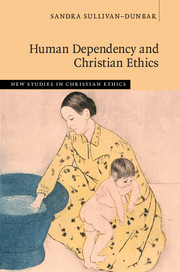Human Dependency and Christian Ethics
Dependency is a central aspect of human existence, as are dependent care relations: relations between caregivers and young children, persons with disabilities, or frail elderly persons. In this book, Sandra Sullivan-Dunbar argues that many prominent interpretations of Christian love either obscure dependency and care, or fail to adequately address injustice in the global social organization of care. Sullivan-Dunbar engages a wide-ranging interdisciplinary conversation between Christian ethics and economics, political theory, and care scholarship, drawing on the rich body of recent feminist work reintegrating dependency and care into the economic, political, and moral spheres. She identifies essential elements of a Christian ethic of love and justice for dependent care relations in a globalized care economy. She also suggests resources for such an ethic ranging from Catholic social thought, feminist political ethics of care, disability and vulnerability studies, and Christian theological accounts of the divine-human relation.
- Offers a foundational critique of and new insight into several prominent understandings of Christian love, making it useful to scholars and students
- The book is highly interdisciplinary, touching on Christian ethics, Christian love theologies, social contract theory, Rawls, contemporary feminist political theory, feminist economics, and feminist care ethics
- Will appeal to a range of audiences, where each will find new arguments in the conversations they are currently part of, learn some basics of other disciplinary conversations, and see parallels and areas of divergence among these conversations
Product details
September 2017Adobe eBook Reader
9781316731895
0 pages
0kg
This ISBN is for an eBook version which is distributed on our behalf by a third party.
Table of Contents
- 1. Human dependency, justice, and Christian love
- 2. The marginalization of dependency and care in political theory
- 3. Economics and the erasure of the care economy
- 4. Sacrificial models of Christian love: distortions of need, nature, and justice
- 5. Agape as equal regard: importing moral boundaries into Christian ethics
- 6. Contemporary retrievals of thomistic accounts of love and justice
- 7. Elements of justice for a dependent care ethic
- 8. Resources for a Christian ethic of dependent care relations.





